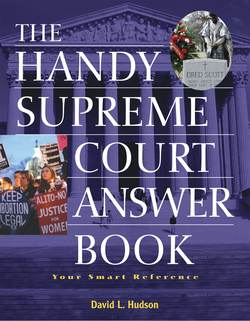Читать книгу The Handy Supreme Court Answer Book - David L Hudson - Страница 226
На сайте Литреса книга снята с продажи.
How did Justice Story respond to this flagrant disregard to U.S. Supreme Court authority?
ОглавлениеStory responded by writing an opinion that clearly established the power of the U.S. Supreme Court to review state supreme court decisions. He upheld the constitutionality of Section 25 of the Judiciary Act of 1789, writing that “the appellate power of the United States must … extend to state tribunals.” Jean Edward Smith, in his biography of Chief Justice Marshall, entitled John Marshall: Definer of a Nation, writes: “Martin v. Hunter’s Lessee provided the rationale for the supremacy of the Union.”
CourtSpeak: Martin v. Hunter’s Lessee (1816), Regarding the Supremacy of Federal Law
Justice Joseph Story: “When, therefore, the states are stripped of some of the highest attributes of sovereignty, and the same are given to the United States; when the legislatures of the states are, in some respects, under the control of congress, and in every case are, under the constitution, bound by the paramount authority of the United States; it is certainly difficult to support the argument that the appellate power over the decisions of state courts is contrary to the genius of our institutions. The courts of the United States can, without question, revise the proceedings of the executive and legislative authorities of the states, and if they are found to be contrary to the constitution, may declare them to be of no legal validity. Surely the exercise of the same right over judicial tribunals is not a higher or more dangerous act of sovereign power.
“Nor can such a right be deemed to impair the independence of state judges. It is assuming the very ground in controversy to assert that they possess an absolute independence of the United States. In respect to the powers granted to the United States, they are not independent; they are expressly bound to obedience by the letter of the constitution; and if they should unintentionally transcend their authority, or misconstrue the constitution, there is no more reason for giving their judgments an absolute and irresistible force, than for giving it to the acts of the other co-ordinate departments of state sovereignty.”
